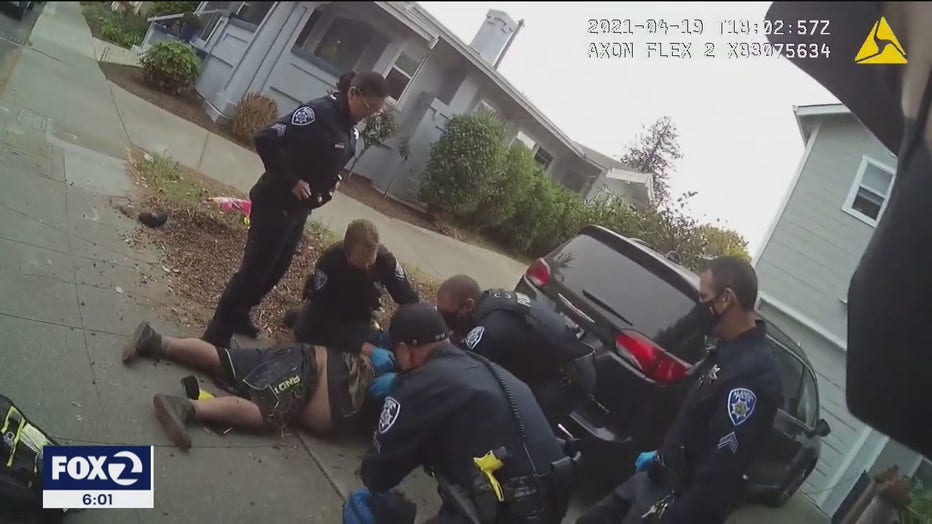Lawyers for Mario Gonzalez write new Alameda police chief

A boy holds a sign in memory of Mario Gonzalez, who died in Alameda police custody on April 19, 2021.
ALAMEDA, Calif. - A civil rights lawyer representing the late Mario Gonzalez, who died after a struggle with officers, has written Alameda's new police chief requesting some specific police reforms.
In a letter obtained by KTVU, Oakland attorneys Julia Sherwin and Michael Haddad wrote Alameda Police Chief Nishant Joshi on Thursday to revise his use-of-force policy, specifically as it pertains to "positional" or "restraint" asphyxia.
While Gonzalez's autopsy has not yet been made public, body camera video on April 19 shows that three police officers and one parking enforcement officer restrained the 26-year-old Oakland man, who was likely intoxicated, by kneeling on his back.
WARNING GRAPHIC VIDEO: Alameda officers kneel on man before his death
Gonzalez eventually went limp. He was pronounced dead at the hospital.

Alameda police officers try to revive Mario Gonzalez of Oakland after police restrained him, prone on the ground. April 19, 2021
In addition, Sherwin and Haddad asked the chief to train all the department's officers, not just some of them, in Crisis Intervention Training, to handle people with mental health issues. They said that often, the non-trained officers are left with emergency situations involving people with mental illness and are forced to act while they are waiting for the specially trained officers and that often leads to tragic consequences.
And the attorneys requested that the police chief adopt a model now being discussed across the country in the wake of George Floyd's murder at the hands of a Minneapolis police officer: That 911 calls be funneled through a dispatch center that sends out mental health care workers to the majority of emergency calls, instead of police. This model, called CAHOOTS, was first launched more than three decades ago in Eugene, Oregon.
The program routes 17% of its calls away from police. And out of 24,000 annual calls, police only had to be called 150 times, according to data provided by the White Bird Clinic, which runs CAHOOTS.
Many cities in the Bay Area, including Oakland and San Francisco, are in the early stages of launching a similar program.
Joshi has not yet responded to the attorneys' requests.
In a general interview last week, Josh said he is committed to being transparent and he wants to create an environment where officers are "cofmortable looking inward and seeing what, if anything, we can do better. There's always room for improvement."
Since he is brand new, he said he needed a little time to get caught up to speed with the particulars of the Gonzalez case.
In a prior interview, Alameda Mayor Marilyn Ezzy Ashcraft told KTVU that the council is working toward creating a similar CAHOOTS program.
Currently, Alameda has a homeless hotline and a Day Center van that will come out to help the unsheltered and those with substance abuse issues. But these agencies are only open 9 a.m. to 5 p.m. during the workweek and residents have to call them directly, which means knowing their phone numbers and the fact that they exist.
Ezzy Ashcraft acknowledged that the services offered are not enough.
She and the other mayors in the county are also trying to compile a list of social service centers so that dispatchers can be aware of programs across city lines and send the right people to the right call.
"You want to make it as user-friendly as possible," Ezzy Ashcraft said in a prior interview. "So I would want the dispatcher to be the one to reach out and say, ‘You know, ‘I can send so-and-so out.’"
Lisa Fernandez is a reporter for KTVU. Email Lisa at lisa.fernandez@foxtv.com or call her at 510-874-0139. Or follow her on Twitter @ljfernandez

